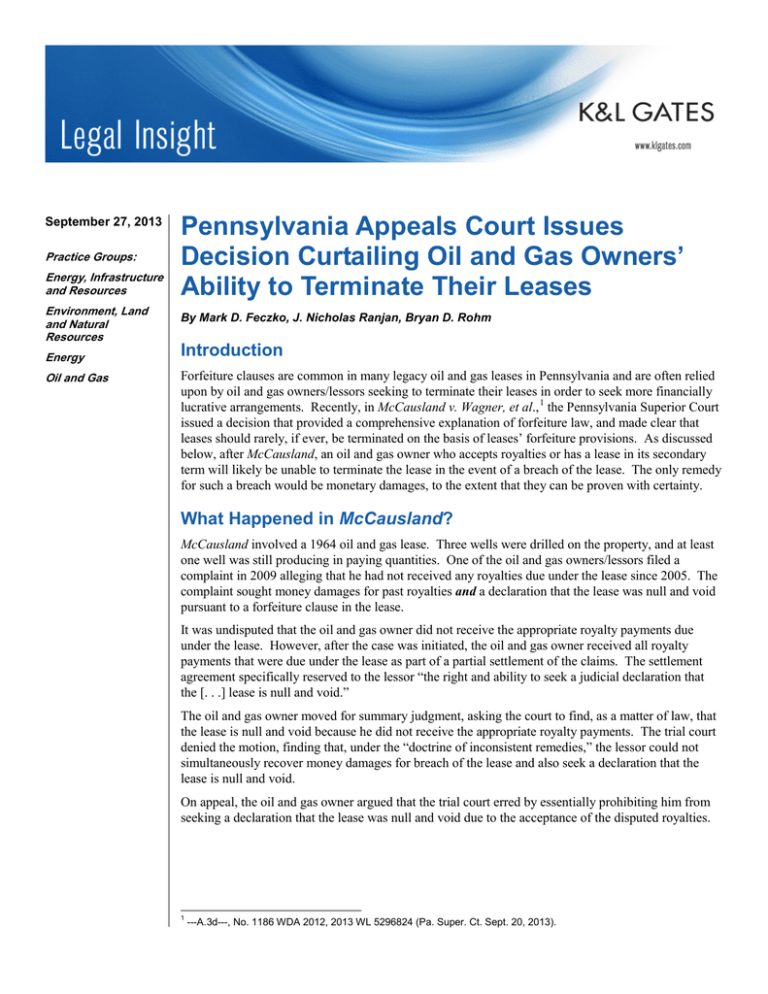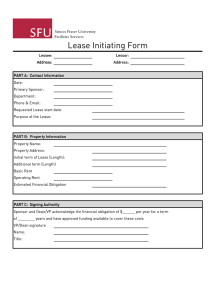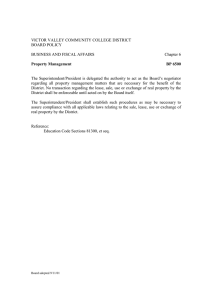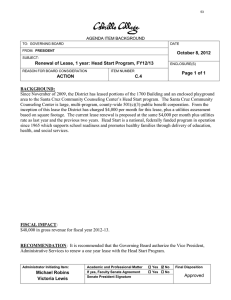
September 27, 2013
Practice Groups:
Energy, Infrastructure
and Resources
Environment, Land
and Natural
Resources
Energy
Oil and Gas
Pennsylvania Appeals Court Issues
Decision Curtailing Oil and Gas Owners’
Ability to Terminate Their Leases
By Mark D. Feczko, J. Nicholas Ranjan, Bryan D. Rohm
Introduction
Forfeiture clauses are common in many legacy oil and gas leases in Pennsylvania and are often relied
upon by oil and gas owners/lessors seeking to terminate their leases in order to seek more financially
lucrative arrangements. Recently, in McCausland v. Wagner, et al., 1 the Pennsylvania Superior Court
issued a decision that provided a comprehensive explanation of forfeiture law, and made clear that
leases should rarely, if ever, be terminated on the basis of leases’ forfeiture provisions. As discussed
below, after McCausland, an oil and gas owner who accepts royalties or has a lease in its secondary
term will likely be unable to terminate the lease in the event of a breach of the lease. The only remedy
for such a breach would be monetary damages, to the extent that they can be proven with certainty.
What Happened in McCausland?
McCausland involved a 1964 oil and gas lease. Three wells were drilled on the property, and at least
one well was still producing in paying quantities. One of the oil and gas owners/lessors filed a
complaint in 2009 alleging that he had not received any royalties due under the lease since 2005. The
complaint sought money damages for past royalties and a declaration that the lease was null and void
pursuant to a forfeiture clause in the lease.
It was undisputed that the oil and gas owner did not receive the appropriate royalty payments due
under the lease. However, after the case was initiated, the oil and gas owner received all royalty
payments that were due under the lease as part of a partial settlement of the claims. The settlement
agreement specifically reserved to the lessor “the right and ability to seek a judicial declaration that
the [. . .] lease is null and void.”
The oil and gas owner moved for summary judgment, asking the court to find, as a matter of law, that
the lease is null and void because he did not receive the appropriate royalty payments. The trial court
denied the motion, finding that, under the “doctrine of inconsistent remedies,” the lessor could not
simultaneously recover money damages for breach of the lease and also seek a declaration that the
lease is null and void.
On appeal, the oil and gas owner argued that the trial court erred by essentially prohibiting him from
seeking a declaration that the lease was null and void due to the acceptance of the disputed royalties.
1
---A.3d---, No. 1186 WDA 2012, 2013 WL 5296824 (Pa. Super. Ct. Sept. 20, 2013).
Pennsylvania Appeals Court Issues Decision Curtailing Oil
and Gas Owners’ Ability to Terminate Their Leases
What Did the Superior Court Decide?
A. Inconsistent remedies: An oil and gas owner may not both terminate a lease
and seek to enforce its terms.
The Superior Court affirmed the trial court decision finding that a lessor cannot seek inconsistent
remedies. In doing so, it summarized the doctrine of inconsistent remedies, stating that it is wellsettled under Pennsylvania law that:
In a breach of contract suit, the plaintiff either may rescind the contract and seek
restitution or enforce the contract and recover damages . . . In such a case, the
inconsistent nature of those actions is obvious—one cannot attempt to terminate his
contractual obligations and, at the same time, seek to enforce the contract and enjoy
its full benefits in an action for breach.
The Court noted that it was undisputed that the oil and gas owner did not receive the appropriate
royalty payments due under the lease. However, the oil and gas owner subsequently received all
royalty payments that were due under the lease. “[I]n accepting the royalty payments, the [oil and gas
owner] essentially deprived himself of the right to declare a forfeiture of the [. . .] lease.”
B. Forfeiture provisions customarily will not terminate oil and gas leases in the
secondary term.
In reaching its decision that forfeiture clauses customarily will not apply to leases in the secondary
term, the Court first summarized Pennsylvania’s historical approach to forfeiture provisions in oil and
gas leases, specifically noting that (i) “it is an oft-stated maxim that the law abhors a forfeiture” of oil
and gas leases, (ii) “it is well established that the party seeking to terminate an oil and gas lease bears
the burden of proof,” and (iii) in order for a forfeiture provision to be enforceable, it must be
“expressed with clearness and certainty.”
The Court then discussed its 1899 decision in Wheeling v. Phillips 2 as instructional in the application
of forfeiture clauses to oil and gas leases. According to Wheeling, where there has been a breach of
the lease, a lessor has two options: (i) demand and compel payment, which is an election to continue
the lease; or (ii) notify the lessee that there has been a forfeiture. The acceptance of payment after the
right to forfeiture accrues operates as a waiver of the right to declare forfeiture.
Based principally on Wheeling, the structure of the lease at issue, and the discerned purpose of
forfeiture clauses, the Court held that the forfeiture provision did not apply, for at least two reasons.
First, more broadly, the Court explained that the purpose of forfeiture provisions in oil and gas leases
“was to guarantee that the lessee would develop the property and, if the lessee failed to do so, the
lessor could declare a forfeiture.” Accordingly, consistent with this view of the purpose of forfeiture
clauses, the Court found that a lease that has been developed such that it is properly held by
production beyond its primary term would not be subject to a forfeiture provision.
Second, as a matter of construction of the particular lease at issue, the Court found that the structure of
the lease was such that the forfeiture clause, if it were applicable, only applied to failure to pay delay
rentals (or complete one well on the premises), not failure to pay royalties. 3
2
10 Pa. Super. 634 (Pa. Super. Ct. 1899).
The lease at issue contained a royalty provision providing for a fractional royalty payable annually. Two paragraphs after
the royalty provision, the lease contained a delay rental and drilling commitment. Immediately after this provision, the
3
2
Pennsylvania Appeals Court Issues Decision Curtailing Oil
and Gas Owners’ Ability to Terminate Their Leases
What Is the Impact of McCausland?
McCausland serves as strong, recent Pennsylvania authority that essentially forecloses an oil and gas
owner/lessor from being able to terminate his lease due to a purported breach by the natural gas
producer so long as the lease is being properly held by production. Based on the Superior Court’s
interpretation of the customary purpose of a forfeiture provision, lessors may have difficulty seeking
to terminate a lease in the secondary term based on a forfeiture provision. Therefore, given the
frequency in which lessors attempt to rely on forfeiture provisions, oil and gas companies involved in
lease litigation should: (i) be cognizant that forfeiture clauses will generally only be applicable during
the primary term of an oil and gas lease, and (ii) beware of lessors’ requests/actions that may preclude
termination of the lease under the doctrine of inconsistent remedies.
Authors:
Mark D. Feczko
mark.feczko@klgates.com
+1.412.355.6274
J. Nicholas Ranjan
nicholas.ranjan@klgates.com
+1.412.355.8618
Bryan D. Rohm
bryan.rohm@klgates.com
+1.412.355.8682
Anchorage Austin Beijing Berlin Boston Brisbane Brussels Charleston Charlotte Chicago Dallas Doha Dubai Fort Worth Frankfurt
Harrisburg Hong Kong Houston London Los Angeles Melbourne Miami Milan Moscow Newark New York Orange County Palo Alto Paris
Perth Pittsburgh Portland Raleigh Research Triangle Park San Diego San Francisco São Paulo Seattle Seoul Shanghai Singapore Spokane
Sydney Taipei Tokyo Warsaw Washington, D.C. Wilmington
K&L Gates practices out of 48 fully integrated offices located in the United States, Asia, Australia, Europe, the
Middle East and South America and represents leading global corporations, growth and middle-market companies,
capital markets participants and entrepreneurs in every major industry group as well as public sector entities,
educational institutions, philanthropic organizations and individuals. For more information about K&L Gates or its
locations, practices and registrations, visit www.klgates.com.
This publication is for informational purposes and does not contain or convey legal advice. The information herein should not be used or relied upon in
regard to any particular facts or circumstances without first consulting a lawyer.
©2013 K&L Gates LLP. All Rights Reserved.
lease contained a forfeiture provision, which provided for forfeiture for “failure to make any one of such payments, or to
complete one well on the premises.” As a matter of construction of the lease, the Court found that the forfeiture provision
only applied to the failure to make delay rental payments (not royalty payments) because the placement of the forfeiture
provision immediately followed the delay rental provision, and the clause “such payments” was meant to refer to the delay
rentals in the immediately preceding paragraph.
3




